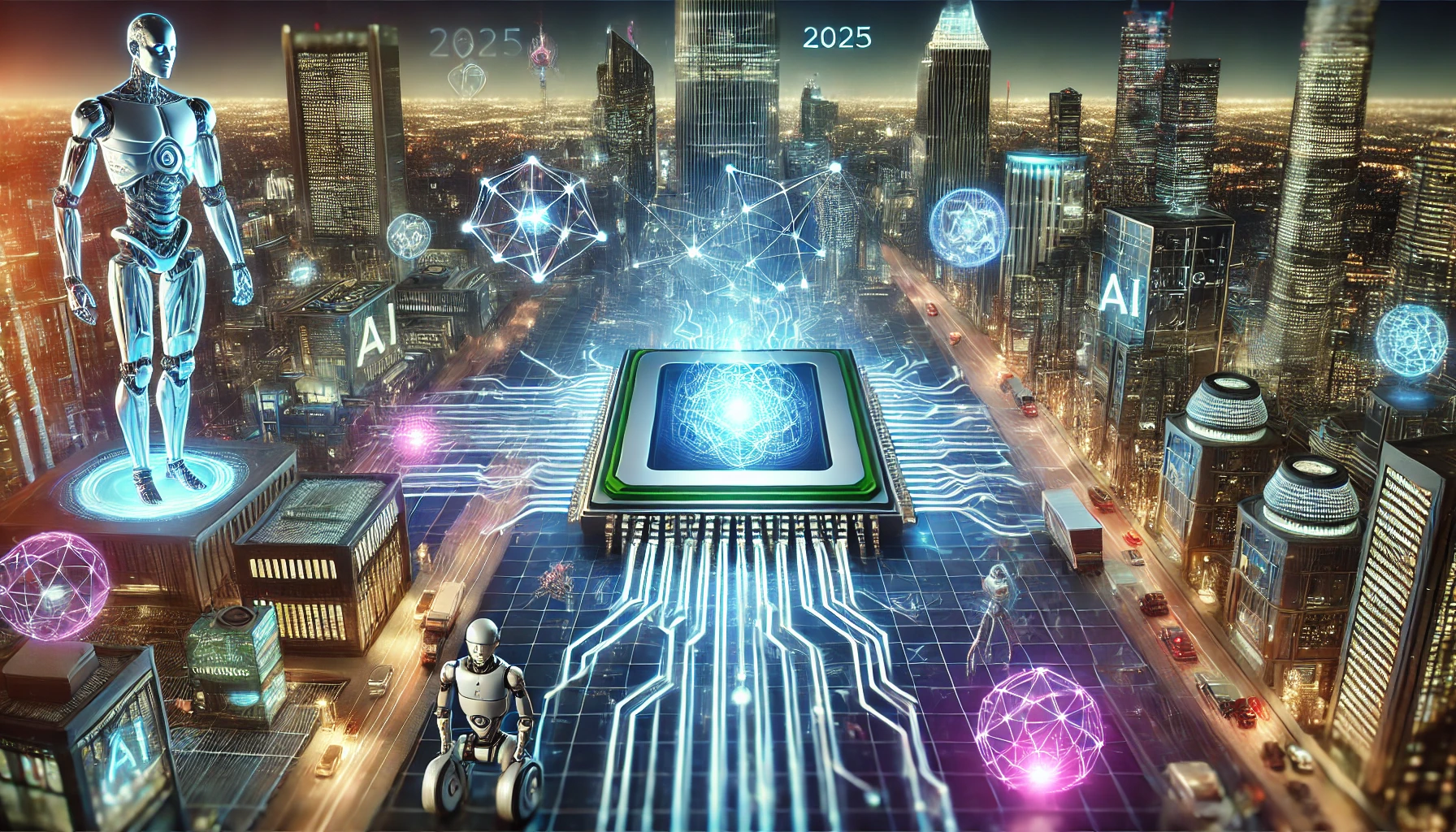Artificial Intelligence (AI) and Quantum Computing are reshaping the future by revolutionizing industries through advanced problem-solving and intelligent automation, promising transformative changes across healthcare, finance, and beyond.
What You Will Learn
In this article, you will gain an understanding of how Artificial Intelligence (AI) and Quantum Computing are set to revolutionize industries and everyday life by 2025. It begins by explaining the independent impact of AI in automating workflows, personalizing user experiences, and streamlining decision-making processes. Then, it explores the transformative power of Quantum Computing, particularly its ability to solve complex problems in fields like cryptography, logistics, and pharmaceuticals.
Most importantly, you will discover the potential of AI and Quantum Computing working together, creating solutions far beyond the capabilities of current technology. Whether you’re interested in healthcare, finance, or smart city innovations, this article highlights how these technologies will shape the future.
By the end of this read, you’ll not only understand these technologies but also their real-world implications and the opportunities they present for businesses and society.
The Intersection of AI and Quantum Computing
As the world advances towards 2025, two groundbreaking technologies—Artificial Intelligence (AI) and Quantum Computing—are taking center stage, promising to reshape industries and revolutionize how we solve problems. While AI has already made strides in automating tasks, improving decision-making, and personalizing user experiences, Quantum Computing is still emerging as a powerful tool for solving highly complex challenges that traditional computers cannot handle efficiently.
AI operates through machine learning and data-driven algorithms, enabling systems to “learn” and improve from experience. It powers applications from predictive analytics in healthcare to self-driving cars in transportation. On the other hand, Quantum Computing uses principles of quantum mechanics to perform computations at speeds unimaginable by classical computers. This allows it to address problems in cryptography, optimization, and molecular modeling that were once deemed unsolvable.
But what happens when these two revolutionary technologies converge? Experts believe the synergy between AI and Quantum Computing will unlock unprecedented potential, enabling solutions far beyond the capabilities of current systems. Imagine AI algorithms running on quantum processors—able to process and analyze enormous datasets in seconds. This convergence could lead to breakthroughs in areas such as personalized medicine, financial modeling, and global climate forecasting.
This article explores the transformative impact of these technologies on industries, highlighting their independent advancements, collaborative potential, and the future they promise to create. By understanding how AI and Quantum Computing are shaping tomorrow, businesses, innovators, and individuals can better prepare for the opportunities and challenges ahead.
With digital transformation accelerating globally, AI and Quantum Computing stand as pillars of innovation. By 2025, their influence will redefine how we interact with technology, solve problems, and build a smarter, more sustainable world.
How Artificial Intelligence is Transforming Industries
Artificial Intelligence (AI) has rapidly evolved from a futuristic concept to a vital part of modern industries. By 2025, its impact is expected to become even more pervasive, fundamentally altering how businesses operate and interact with consumers. AI’s ability to process vast amounts of data, identify patterns, and make decisions is driving its adoption across a wide array of sectors.
Key Applications of AI Across Industries:
- Healthcare
AI is revolutionizing healthcare through:- Predictive Analytics: Algorithms that forecast disease outbreaks based on historical data.
- Personalized Medicine: AI-driven systems analyze genetic information to tailor treatments for individuals.
- Medical Imaging: Tools like deep learning can detect anomalies in X-rays or MRIs with high precision.
- Finance
In the financial sector, AI is used to:- Fraud Detection: Real-time monitoring of transactions to detect unusual patterns.
- Algorithmic Trading: Systems optimize investment strategies by analyzing market trends.
- Customer Support: AI chatbots improve customer experiences by providing instant assistance.
- Retail and E-Commerce
AI enhances customer experiences by:- Recommendation Systems: Platforms like Amazon and Netflix use AI to suggest products or content.
- Inventory Management: Predictive algorithms help retailers optimize stock levels.
- Chatbots: AI-driven virtual assistants provide real-time customer service.
- Transportation
- Autonomous Vehicles: AI enables self-driving cars to interpret their surroundings and make split-second decisions.
- Traffic Management: Predictive systems reduce congestion and improve urban mobility.
- Manufacturing
- Robotics: AI-driven robots handle repetitive tasks, improving efficiency and safety.
- Quality Control: Machine learning algorithms detect defects in real-time.
AI’s Broader Impact
AI doesn’t just optimize existing processes; it creates entirely new possibilities. For instance:
- AI-generated content is reshaping marketing strategies.
- Smart cities use AI for energy optimization, reducing costs and environmental impact.
- AI in education creates personalized learning paths for students, enhancing engagement and retention.
Challenges in AI Adoption
Despite its benefits, AI implementation comes with challenges:
- Ethical Concerns: Ensuring AI systems make unbiased decisions.
- Data Privacy: Protecting user information while leveraging data for AI.
- Skill Gaps: The demand for AI expertise often exceeds supply.
The Road Ahead
By 2025, AI will further penetrate industries, enhancing productivity, innovation, and personalization. Its ability to adapt and learn ensures that businesses leveraging AI will gain a competitive edge in an increasingly digital world. As organizations continue to integrate AI, their success will depend on how well they address ethical concerns, regulatory challenges, and workforce readiness.
The Quantum Leap: Advancements in Quantum Computing
Quantum Computing represents a paradigm shift in the world of technology. Unlike classical computers that rely on binary logic (0s and 1s), quantum computers use quantum bits, or qubits, which can exist in multiple states simultaneously due to the principles of superposition and entanglement. This unique capability allows quantum computers to process vast amounts of data at unparalleled speeds, making them a game-changer in solving complex problems across industries.
How Quantum Computing Works
Quantum computing leverages two primary principles:
- Superposition: Enables qubits to represent multiple states at once, vastly increasing computational possibilities.
- Entanglement: Creates a correlation between qubits, allowing changes in one qubit to affect others instantaneously.
These principles make quantum computers exponentially more powerful than classical counterparts for specific tasks, such as optimization problems or simulating molecular structures.
Applications of Quantum Computing by 2025
- Cryptography
Quantum computing poses both opportunities and threats to data security:- Breaking Classical Encryption: Algorithms like Shor’s algorithm can break widely used encryption protocols.
- Quantum-Safe Cryptography: Encourages the development of encryption methods resistant to quantum attacks.
- Healthcare
Quantum computers are revolutionizing drug discovery by:- Simulating molecular interactions to develop effective medicines faster.
- Analyzing vast datasets for precision medicine tailored to individuals.
- Logistics and Supply Chain Optimization
- Quantum computing helps businesses optimize delivery routes, inventory management, and resource allocation, reducing costs and inefficiencies.
- Climate Modeling
Quantum systems can simulate complex environmental systems to predict climate patterns, aiding in the fight against global warming. - Artificial Intelligence Enhancement
Quantum computing accelerates machine learning algorithms by rapidly processing and analyzing massive datasets, improving AI capabilities.
The Challenges of Quantum Computing
- Hardware Development
Quantum computers are still in their infancy. Maintaining quantum coherence and stability remains a significant hurdle. - Cost and Accessibility
Quantum computing infrastructure is expensive and currently accessible only to leading tech companies and research institutions. - Ethical Concerns
The potential misuse of quantum technology, especially in breaking encryption, raises ethical and security questions.
Quantum Computing Leaders
Several organizations are at the forefront of quantum computing:
- IBM: Offers cloud-based quantum computing services through its IBM Quantum platform.
- Google: Achieved “quantum supremacy” with its Sycamore processor.
- Microsoft: Focuses on quantum development through its Azure Quantum platform.
The Road Ahead for Quantum Computing
By 2025, quantum computing is expected to become more accessible, with practical applications in fields like logistics, healthcare, and financial modeling. As organizations explore quantum algorithms and hybrid systems combining classical and quantum computers, the technology will push boundaries in areas previously thought impossible.
Quantum computing is not just the future; it is a bridge to solving the most complex problems of today. Industries that embrace this technology will stand at the forefront of innovation.
The Synergy Between AI and Quantum Computing
The convergence of Artificial Intelligence (AI) and Quantum Computing is one of the most anticipated technological breakthroughs. While both technologies are revolutionary on their own, their combination holds the potential to unlock unprecedented possibilities. By leveraging quantum computers’ ability to process vast datasets and AI’s capacity for intelligent analysis, industries can achieve solutions far beyond the capabilities of classical systems.
How AI and Quantum Computing Complement Each Other
- Enhancing Machine Learning
Quantum computing accelerates machine learning algorithms by handling complex calculations more efficiently. This enables:- Faster training of deep learning models.
- More accurate predictions and decision-making.
- Solving Optimization Problems
AI algorithms often encounter bottlenecks when solving large-scale optimization problems. Quantum computing’s ability to process multiple solutions simultaneously provides a breakthrough in:- Supply chain management.
- Financial portfolio optimization.
- Traffic flow analysis.
- Improving Data Processing
- Quantum Speed: Quantum computers can process and analyze enormous datasets in seconds, making AI systems more effective.
- Complex Data Structures: Quantum systems excel in handling multi-dimensional data, a common requirement for AI tasks.
Applications of AI-Quantum Synergy
- Healthcare and Drug Discovery
- AI models trained on quantum-processed data can identify patterns in genetic sequences, accelerating drug development and personalized treatments.
- Financial Modeling
- Quantum-powered AI can simulate market scenarios more accurately, helping investors make informed decisions in real-time.
- Climate Change Solutions
- AI, powered by quantum processing, can model climate systems more effectively, predicting environmental changes with greater precision.
- Cybersecurity
- Quantum-enhanced AI systems can identify and counter cyber threats in real-time, providing robust defense mechanisms.
Industries Poised to Benefit
- Healthcare: Faster diagnostics and treatment options through quantum-enhanced AI models.
- Logistics: Optimized delivery routes and resource management using quantum-based algorithms.
- Energy: Improved renewable energy systems through predictive AI models processed on quantum platforms.
Challenges in Combining AI and Quantum Computing
While the synergy between AI and Quantum Computing is promising, several challenges remain:
- Scalability: Quantum computing is still in its early stages, limiting large-scale deployment.
- Complexity: Integrating quantum algorithms into AI systems requires expertise and advanced infrastructure.
- Ethics and Security: The misuse of such powerful technologies could lead to significant societal impacts.
The Future of AI-Quantum Synergy
By 2025, the collaboration between AI and Quantum Computing is expected to yield significant advancements:
- AI models will become exponentially smarter, thanks to quantum processing power.
- Industries will solve problems once deemed unsolvable, from curing rare diseases to managing global supply chains.
- Businesses that adopt AI-Quantum systems will gain a competitive edge in innovation and efficiency.
The partnership between AI and Quantum Computing isn’t just about faster computations—it’s about enabling humanity to tackle its most pressing challenges with intelligence and precision.
The Future of Technology: Industries Set for Transformation
The transformative power of Artificial Intelligence (AI) and Quantum Computing is reshaping industries, driving innovation, and creating opportunities that were once unimaginable. By 2025, their integration will redefine how businesses operate, optimize resources, and deliver value to their customers. This section explores industries poised to undergo significant transformation.
1. Healthcare: Precision and Personalized Medicine
AI-powered diagnostics and quantum simulations are revolutionizing healthcare by improving precision and efficiency:
- Early Disease Detection: AI can analyze patient data to identify early warning signs of diseases.
- Drug Development: Quantum computers simulate molecular interactions, reducing the time and cost of developing new treatments.
- Personalized Healthcare: AI algorithms tailor treatment plans to individual patient needs based on genetic and lifestyle data.
Example: Pharmaceutical companies are using quantum-enhanced AI to design cancer treatments that target specific cell mutations.
2. Finance: Revolutionizing Decision-Making
The financial sector is leveraging AI and quantum computing to:
- Optimize Investment Portfolios: Quantum systems process vast datasets to identify profitable opportunities.
- Fraud Detection: AI systems analyze transaction patterns in real-time to detect anomalies.
- Risk Analysis: Quantum-enhanced models simulate market scenarios to predict potential risks more accurately.
Example: Investment firms are using AI-Quantum synergy to build resilient financial models in volatile markets.
3. Transportation: Smarter and Safer Mobility
From autonomous vehicles to optimized logistics, AI and quantum computing are enabling:
- Self-Driving Cars: AI processes real-time traffic data, while quantum algorithms optimize navigation.
- Efficient Logistics: Quantum computing streamlines supply chain operations by solving complex routing problems.
- Traffic Flow Management: AI models predict congestion patterns, improving urban mobility.
Example: Logistics companies like DHL are exploring quantum algorithms to optimize delivery routes.
4. Energy and Environment: Driving Sustainability
As sustainability becomes a global priority, AI and quantum computing are transforming energy management:
- Renewable Energy Optimization: AI predicts energy demand and integrates renewable sources efficiently.
- Carbon Capture Technologies: Quantum simulations model chemical reactions to develop effective carbon capture methods.
- Climate Modeling: AI-Quantum systems analyze environmental data to predict and mitigate climate impacts.
Example: Energy providers are using quantum-enhanced AI to optimize wind and solar energy grids.
5. Retail and E-Commerce: Enhanced Customer Experiences
AI-driven tools and quantum computing are redefining the shopping experience:
- Personalized Recommendations: AI algorithms suggest products based on customer behavior.
- Inventory Management: Quantum systems optimize stock levels, reducing waste.
- Dynamic Pricing: AI models adjust pricing strategies in real-time based on demand.
Example: E-commerce platforms like Amazon are integrating AI-powered personalization with quantum-enhanced inventory systems.
Challenges to Overcome
While the potential is immense, these technologies face barriers such as:
- Cost of Implementation: Quantum infrastructure remains expensive and limited to large enterprises.
- Data Privacy: Handling sensitive data with AI and quantum computing requires stringent regulations.
- Workforce Skills: Industries must address the gap in expertise needed to deploy these technologies effectively.
The Road Ahead
By 2025, industries embracing AI and quantum computing will lead the way in innovation, efficiency, and sustainability. These technologies will not only solve existing problems but also create new opportunities, redefining the future of work, business, and society.
The Future of Technology Across Society
The integration of Artificial Intelligence (AI) and Quantum Computing will not only revolutionize industries but also transform the broader fabric of society. By 2025, these technologies will enhance how individuals interact with the world, address global challenges, and redefine the possibilities of human achievement.
1. Education: Personalized and Immersive Learning
AI and quantum computing are paving the way for smarter, more adaptive education systems:
- Customized Curricula: AI tailors learning paths based on individual student needs, making education more effective.
- Virtual Classrooms: AI-enabled virtual environments and metaverse technologies will provide immersive, interactive learning experiences.
- Research Acceleration: Quantum computing speeds up complex simulations, enabling breakthroughs in scientific research.
Example: Universities are experimenting with quantum-powered AI tools to model climate change in real-time, enriching environmental studies.
2. Smart Cities: Enhancing Urban Living
AI and quantum computing are vital to developing efficient, sustainable smart cities:
- Traffic Optimization: Quantum-enhanced AI models predict and manage traffic congestion, reducing commute times and fuel consumption.
- Energy Efficiency: AI algorithms optimize energy use in smart grids, integrating renewable energy sources seamlessly.
- Public Safety: AI-powered surveillance systems and predictive analytics enhance city security.
Example: Cities like Singapore are adopting AI and IoT to manage urban planning and improve residents’ quality of life.
3. Environmental Sustainability: A Global Priority
The environmental impact of these technologies cannot be overstated:
- Climate Change Solutions: Quantum systems simulate climate scenarios, helping policymakers create effective strategies.
- Sustainable Agriculture: AI-powered models predict crop yields and optimize irrigation, reducing resource waste.
- Carbon Neutrality: Quantum computing aids in designing carbon capture technologies to combat global warming.
Example: NGOs and governments are partnering with quantum researchers to design sustainable solutions for global environmental challenges.
4. Healthcare for All: Equitable and Accessible Solutions
AI and quantum computing are bringing affordable, high-quality healthcare to underserved regions:
- Remote Diagnostics: AI-powered telemedicine platforms provide accurate diagnoses in remote areas.
- Affordable Treatments: Quantum simulations reduce the cost and time required for drug development, making treatments more accessible.
- Global Health Monitoring: AI analyzes global health data to predict and manage pandemics effectively.
Example: During the COVID-19 pandemic, AI systems helped track the spread of the virus, aiding in timely interventions.
5. Ethical and Social Implications
While these technologies promise immense benefits, they also present challenges that society must address:
- Bias in AI: Developers must ensure AI algorithms are inclusive and free from discrimination.
- Data Privacy: The widespread use of AI and quantum computing requires robust regulations to protect individual rights.
- Job Displacement: Automation could lead to significant workforce disruptions, necessitating reskilling initiatives.
The Road to a Better Future
By 2025, AI and Quantum Computing will be central to solving humanity’s most pressing problems:
- Reducing inequality by providing access to technology and resources.
- Building resilient systems to tackle climate change and health crises.
- Empowering individuals and communities with smarter, faster, and more equitable solutions.
These technologies represent a future where society operates at the intersection of intelligence and sustainability. While challenges remain, the path forward is one of opportunity, collaboration, and innovation.
FAQs: Common Questions About AI and Quantum Computing
Q1: What is the primary difference between Artificial Intelligence and Quantum Computing?
- AI refers to systems that simulate human intelligence, such as learning, reasoning, and problem-solving. Quantum Computing, on the other hand, uses quantum mechanics to perform computations at unparalleled speeds, solving problems beyond the reach of classical computers.
Q2: How will the combination of AI and Quantum Computing impact industries?
- The synergy between these technologies will enable industries to solve complex problems more efficiently, such as optimizing supply chains, enhancing healthcare diagnostics, and advancing climate modeling.
Q3: What industries will benefit the most by 2025?
- Key beneficiaries include healthcare, finance, transportation, energy, and education, where AI and Quantum Computing will streamline operations, reduce costs, and enhance decision-making.
Q4: Is Quantum Computing commercially available?
- While still in its early stages, quantum computing is becoming accessible through cloud platforms like IBM Quantum and Google’s Quantum AI. Its full commercial potential is expected to unfold over the next decade.
Q5: What ethical concerns arise with these technologies?
- Ethical issues include AI bias, data privacy violations, and the potential misuse of quantum computing for malicious purposes, such as breaking encryption. Addressing these requires strict regulations and ethical guidelines.
Q6: How can businesses prepare for these technologies?
- Businesses should invest in reskilling employees, collaborating with tech partners, and staying informed about advancements to remain competitive in the evolving landscape.
Q7: Where can I learn more about AI and Quantum Computing?
- To explore more, check out resources like MIT Technology Review for in-depth articles on emerging technologies.



